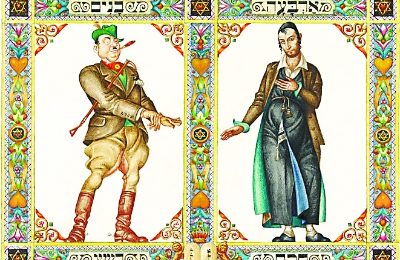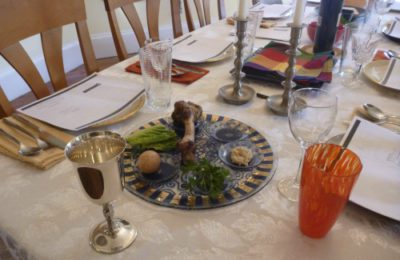We clean our homes thoroughly and spend hours poring over cookbooks planning our menus, but how many of us study for Passover? How many of us pick up the Haggadah prior to the seder, mulling over our thoughts and divrei Torah? Most of us tend to be inspired in the moment, during the seder, amid the discussion.
It’s why, as we noted last year, we find that we have more to say after the seder, than in the lead up. So we thought we’d share with you some of our favorite insights from this year’s seder. (Reminder to self: Next year, re-post our seder insights prior to Pesach!)
Matzah’s Double Symbolism
Although matzah is referred to as ‘poor man’s bread’ and is often used to represent the Israelites at their most downtrodden, the ubiquitous Passover food also carries the extremely positive message of redemption, or freedom. After all, the only reason the Israelites ate matzah was because they were so busy escaping slavery in Egypt, that their bread had no time to rise. This dual meaning is probably why matzah is the most ubiquitous symbol of Passover; that simple flatbread sums up the dichotomy of the seder, slavery and freedom. The splitting of the matzah during Yachatz, the seder’s fourth step, symbolizes this duality.
Four Sons & Moses
The four sons probably illicit the most conversation during the seder, and next to Dayennu and Ma Nishtana, the most associated with the Haggadah. One known approach says that these are not four separate characters or people, but aspects of a single person. This year we heard an interpretation that takes this one step further: Not only are these aspects of humanity, but each aspect, in and of itself, can be perceived as positive or negative. Take, for example, the wise son, or wisdom. He is clearly knowledgeable, but as Don Abarbanel comments, the wise son also comes off as arrogant, or a know it all. Wisdom, or knowledge, is not in and of itself positive; it depends how it’s used. Dictators are often extremely clever is manipulating public opinion, but we don’t find ourselves celebrating their wisdom in doing so.
The wicked son is often described as bad or evil, but he could also be a rebel, the character who goes against the norms or accepted wisdom in order to improve society, or cause society to reflect upon itself. These could be artists or progressives whose ideas clash with the norms, but ultimately enrich our lives.
You may have noticed that Moses isn’t really mentioned in the Haggadah. Could it be that the four sons, combined, represent Moses? His wisdom is demonstrated by his ability to imbibe and transmit the Torah to the entire Jewish nation. Moses was ‘wicked’ in the sense of being a rebel, openly questioning Pharoah. The simple aspect could be represented by Moses fleeing Pharoah’s palace and choosing to lead the life of a shepherd. And finally, midrash says that as a child, Moses, was mute; so therefore, unable to ask questions.
What do you think of our take on the Four Sons? And what were some of the insights you heard at this year’s seders? Let us know in a comment!
















